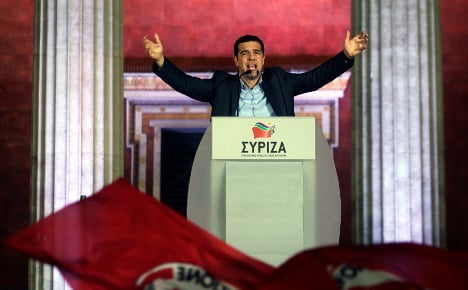"In our view it is important for the new government to take action to foster Greece's continued economic recovery," government spokesman Steffen Seibert told reporters.
"The Greeks have to bear the consequences of their own actions and can't saddle the German taxpayer with them", Christian Democratic Union (CDU) deputy leader in the Bundestag (German parliament) Hans-Peter Friedrich told Bild's Monday edition.
With 36.4 percent of the vote, Syriza won't govern Greece alone, but will negotiate a coalition with a smaller right-wing party.
Syriza leader Alexis Tsipras promised his voters an end to years of deep cuts in public spending and hopes to write off some of Greece's debt, which currently stands at 175 percent of GDP.
Greece has been supported with loans from fellow EU member countries and the International Monetary Fund (IMF) of around €240 billion.
But he promised other EU countries on election night that Greece was ready to talk about a "just and achievable solution" – starting at a meeting of EU Finance Ministers on Monday.
Chancellor Angela Merkel had begged Greek voters not to turn their back on its European partners, asking them to "remain part of our story" at a meeting with the Italian Prime Minister last week.

But the Chancellor will face difficulties given the hostility of Greeks to perceived German interference and the stern reactions of German politicians to the election result, especially those from the CDU who form the majority of the governing coalition.
"We cannot honour breach of contract" said Wolfgang Bosbach, head of the Bundestag's Interior Committee, adding that any leniency shown to Greece would send the wrong signal to other struggling countries.
Thomas Oppermann, leader of the Social-Democratic Party in the Bundestag, maintained that "Germany will continue to stand in solidarity with Greece".
But he called on the new government to continue reforming the country and fighting corruption and cronyism in government and the economy – key factors in meeting Greece's commitments to the so-called "Troika“ of the European Central Bank (ECB), European Commission and IMF.
Meanwhile, ECB board member Benoit Coeure told business newspaper Handelsblatt that Greece couldn't expect any leniency from the Frankfurt-based central bank.
"It is not up to the ECB to decide whether Greece needs debt relief," since that was a political decision, Coeure said.
"But it's absolutely clear that we cannot agree to a debt relief that includes Greek bonds that are located at the ECB," he said.
"That's impossible for legal reasons," he added.
During the debt crisis, the ECB bought up huge amounts of Greek debt and still has some of it on its books.
Cutting that debt would be tantamount to so-called monetary financing – printing money to get a government out of debt – which is strictly forbidden under the ECB's own statutes.
The only voices showing sympathy to Syriza in the German political spectrum came from the left-wing opposition, with both the Left (Linke) Party and the Greens expressing their support.
Green Party leader Simone Peter said that countries in crisis couldn't be fixed just by a "rigorous policy of cuts" and "tightening the noose".
The enforced cuts were leaving no space for Greece to invest in the future, she told the Hamburger Abendblatt on Monday.
Meanwhile Left leader Katja Kipping told Bild that the election result was a "clear rejection of the cuts diktat, which is a social catastrophe and irresponsible for the national economy".
"We are now hoping for a red spring in Europe", she concluded.




 Please whitelist us to continue reading.
Please whitelist us to continue reading.
Member comments